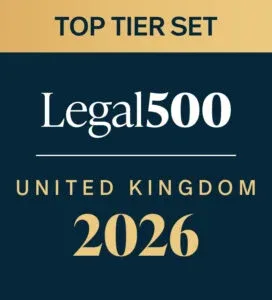Financial Remedy Focus
Added in: Financial Remedies and Family Property
It’s been a quarter of growth for the Financial Remedy Team who have welcomed HH Alan Booth back to chambers as an Associate Member following his retirement from the bench. Alan will be undertaking private FDR’s and early neutral evaluations. Adam Singh Hayer has also joined the team, and now Taran Sanghera has commenced her second six and is accepting instructions in all aspects of financial remedy work.
Edwards Boydell KC recently spoke at the White Paper Conference discussing challenges in the variation of spousal maintenance. Taran and me, have recently published an article for the busy practitioner: “Conduct in financial remedy proceedings: current approach and the call for reform [2025] Fam Law 214” summarising the law, and the recent proposals from the Law Commission and Resolution. Remember also to check out the Summary of Summaries in the Financial Remedies Journal for quick, bitesize information from recent judgments (https://shorturl.at/lEVk9)
Looking ahead, join Sir Nicholas Francis, HH Alan Booth, Edward Boydell KC, Sonny Flood and me on 4 June 2025 for a mock pFDR at the People’s History Museum, to book your place, email ajenkinson@deanscourt.co.uk.
Finally, in this newsletter, Taran has written an article considering the recent judgment of District Judge Crisp, Manchester’s own Lead Financial Remedy Judge, and the treatment of pets on divorce.
Liam Kelly
Dogs on Divorce: FI v DO [2024] EWFC 384
Dogs with Instagram accounts, cat cafes, and doggy daycare - we are a nation obsessed with our pets. During lockdown, 3.2 million households sought a furry friend, bringing the total number of pet-owning homes to 17 million, according to the Pet Food Manufacturer’s Association.[1] Many consider their pet not just a purchase, but a member of the family.
In the eyes of the law, however, pets are chattels in the eyes of the family court when it comes to dividing the assets upon divorce. Chattels, which are usually non-living objects that furnish the family home, are divided and shared between parties on the basis of their monetary value only. A pet that has grown with the family is worth more to owners than the cost of purchase.
Courts around the world are beginning to recognise the importance of the emotional relationship between pets and their owners. In Spain, courts have ruled on who the family pets live with and have even made contact arrangements for the other spouse. In France, pets are considered living beings, not personal property. And. in California, the courts can assign ownership by taking into account the care of the animal.
Lead Financial Remedies Judge for Greater Manchester, District Judge Crisp has recently been called upon to deal with this issue directly in FI v DO. The court was concerned with a golden retriever puppy following the partied separation, and subsequent financial remedy proceedings.
The couple married in 2010, had two children, acquired their pet dog and separated in 2022. The Children Act 1989 application concluded with the children living with the wife and having no contact with the husband. Alongside the application for financial remedy, the husband made an application for return and shared care of the dog. He also issued civil proceedings relating to loss of earnings from litters in the dog’s lifetime.
The husband’s case was that he had paid the full £1,200 for the dog, trained her and registered as a disability support dog to assist his depression and anxiety. He claimed the wife was not adequately caring for the dog post-separation.
The wife claimed she and their daughter had contributed £600, and the husband £600. The wife reported she was the registered keeper, had registered the dog at the Kennel Club and paid for the dog’s insurance and veterinary bills. She disputed the husband’s claim that their dog was a disability support dog.
The court made findings in relation to an incident involving the dog. The husband removed the dog from the wife’s mother whilst taking it for a walk. The dog ran back to the wife’s home, and the husband dragged the dog back into his car, damaging the dog’s paws. The incident resulted in the husband being arrested and reported to the RSPCA. The husband argued that he had more right to the dog than the wife’s mother and denied that it was planned. The court found the incident occurred as the wife described it and the husband had tried to take the dog forcibly.
Following this finding, as well as finding that the husband saw the dog as an income stream and only registered the dog as a disability support dog after the parties separated; the judge ruled the dog should remain with the wife.
The judge relied on the case of RK v RK [2011] EWHC 3901 in which there was no order in respect of the dogs owned between the parties, but comments were made about who had primarily cared for the dogs.
Applying the same sentiment in this case, the judge considered who the dog saw as their carer as the most important factor, not who purchased the dog. The court determined the dog was currently in the care of the wife, and had been for 18 months. The judge found the wife’s evidence demonstrated she was someone ‘who understood about dogs, was compassionate and would always put the dog’s interest first’[2].
This judgment is fitting with the global legal development of pet ownership after divorce. However, whilst the judge clearly takes the dog’s welfare into account, the dog is still referred to as a chattel. Furthermore, the judge felt in ‘the realms of a Children Act application’[3] and carried out welfare considerations, which are misplaced in a financial remedy final hearing. The outcome of the dog is linked to the children. Initially, the wife offered for the dog to move between the two households with the children. The judge also drew upon the likely effect on the children of changing the dog’s home. Determining shared care of pets could be better suited to Children Act proceedings, where welfare is paramount.
How many courts could make regular decisions on a pet’s welfare is uncertain. Will there be a Pets and Family Courts Advisory and Support Service (PAFCASS)? Will judges require evidence of parties looking after their pets? Or perhaps dogs will be placed between parties in a courtroom whilst a judge presides and asked to pick their favourite owner.
A further judgment from a higher court will likely be required to clarify how dogs will be dealt with by the court on separation.
Outside of court, there is an increase of ‘Pet-Nups’, which are agreements between the parties of what should happen to their pets on separation. This could be a separate agreement or a clause included within a Pre-Nuptial Agreement. As the courts place more weight on Pre-Nuptial Agreements, which are becoming more popular, this could be the best way forward to manage pet ownership after separation.
An independent ”Working Group on Pets on Divorce and Separation” has been created, founded by Estella Newbold-Brown of Amphlett Lissimore, seeking to work with government and others to actively explore how to change the treatment of pets following divorce and separation.
Taran Sanghera
[1] https://www.bbc.co.uk/news/business-56362987 (12 March 2021)
[2] FI v DO [2024] EWFC 384 [71]
[3] FI v DO [2024] EWFC 384 [41]










